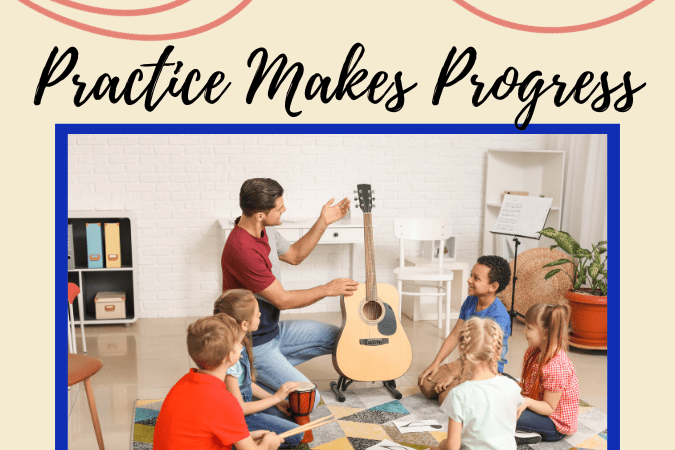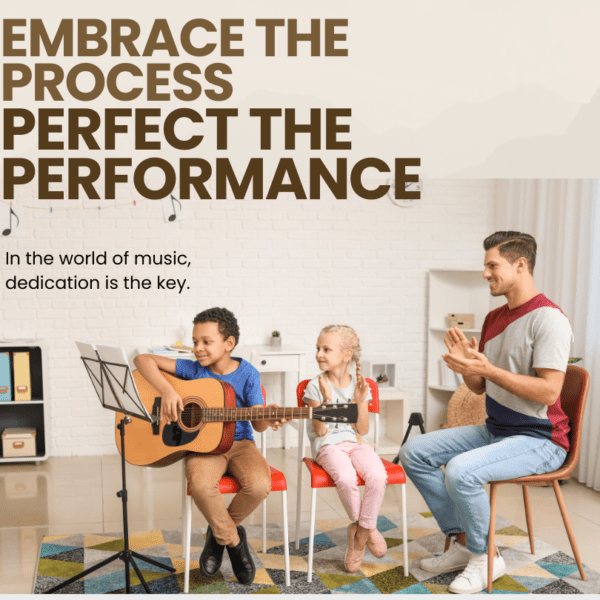
"Practice Makes Perfect"
We’ve all heard- “Practice makes perfect”. What does that even mean? Can you quantify that? I’ve heard music teachers throw some random number to their students – “make sure you practice 20 minutes a day.” But practice what? What’s the difference between playing (noodling) and practice? If I sit around and noodle some notes for 20 minutes does that count?
Music is often regarded as a beautiful blend of artistry and skill, but behind every impressive performance lies hours of dedicated practice and refinement. Whether you’re a novice musician or an experienced player looking to enhance your abilities, the adage “practice makes perfect” holds significant truth in the realm of musical proficiency. However, it’s not just about putting in the hours; it’s about employing effective strategies to make the most out of your practice sessions.

Set Clear Goals
Before starting a practice session, define specific and achievable goals. Whether it’s mastering a complex piece, improving technical skills, or refining dynamics, having a clear objective keeps you focused and motivated throughout your practice.
Structured Practice Sessions
Break down your practice time into focused segments. Work on different aspects of your music, such as scales, technique, sight-reading, and repertoire. Allocate specific time slots to each area, ensuring a well-rounded practice routine.
Want A Smarter Kid?
“Lil Einsteins” is specially crafted to engage preschoolers’ natural love of music and activate their imagination.
We make smarter kids.
Enroll Your Child Today!
Click HereConsistency is the Key
Regular practice is vital for skill improvement. Even short, consistent practice sessions build muscle memory more effectively than sporadic or inconsistent practice sessions. Aim for daily practice, even if it’s for a shorter duration, to maintain continuity and progress steadily.
Quality of Practice Matters
It’s not just about the hours spent practicing but the quality of that practice. Deliberate, focused, and purposeful practice by focusing on weaknesses and challenging areas. Identify problem areas within a piece or technique and work on them methodically. Break down difficult passages, practice them slowly, and gradually increase speed and complexity.
GROUP GUITAR CLASS
50% OFF FOR THE FIRST 40 ENROLLEES
*EXTRA SPECIAL* – we’ll also WAIVE the $35 registration fee for the first 40 to enroll
Guitar rentals from $18 per month
Practice your way to perfection and let the melodies resonate!

LEARN GUITAR WITH THE BEATLES
50% OFF FOR THE FIRST 40 ENROLLEES
*EXTRA SPECIAL* – we’ll also WAIVE the $35 registration fee for the first 40 to enroll
Guitar rentals from $18 per month
GROUP PIANO CLASS
50% OFF FOR THE FIRST 40 ENROLLEES
*EXTRA SPECIAL* – we’ll also WAIVE the $35 registration fee for the first 40 to enroll
Guitar rentals from $18 per month
Utilize Different Practice Techniques
Divide a piece into smaller sections. You should practice well below tempo for accuracy. Also, try to practice mentally. Visual the piece away from the instrument. Finally, always use a metronome to improve timing and rhythm. Using a metronome consistently will program your inner clock.
Record and Evaluate
Record your practice sessions periodically to assess your progress objectively. Listening back allows you to identify areas needing improvement that might not be evident during play. It’s an effective tool for self-assessment and tracking your development over time.
GROUP VOICE CLASS
50% OFF FOR THE FIRST 40 ENROLLEES
*EXTRA SPECIAL* – we’ll also WAIVE the $35 registration fee for the first 40 to enroll
Guitar rentals from $18 per month
Seek Guidance and Feedback
A teacher or mentor can provide invaluable guidance and feedback. They offer insights, correct mistakes, suggest alternative approaches, and motivate you to push your boundaries. Constructive criticism is crucial for continuous improvement. Also, you don’t know what you don’t know. That means you don’t even know that you don’t know it. Think about that one.
Mindful Practice
Focus on quality over quantity. Mindful practice involves being present and fully engaged during your practice sessions. Concentrate on every note, expression, and technique, ensuring each repetition contributes meaningfully to your progress.


Maintain Physical and Mental Well-being: Take care of your physical health by practicing proper posture, stretching, and avoiding overexertion. Additionally, mental well-being is equally important; stay motivated, manage stress, and take breaks when needed to prevent burnout.
Diversify Practice Routine: Explore different genres and styles to broaden your musical horizons. Learning diverse music styles challenges you to adapt and improves overall musicianship, fostering creativity and versatility.
GROUP UKULELE CLASS
50% OFF FOR THE FIRST 40 ENROLLEES
*EXTRA SPECIAL* – we’ll also WAIVE the $35 registration fee for the first 40 to enroll
Guitar rentals from $18 per month
In essence, practicing music lessons consistently and purposefully is fundamental to honing skills, understanding music deeply, and achieving a level of proficiency and mastery that approaches perfection.
GROUP STRINGS CLASS
50% OFF FOR THE FIRST 40 ENROLLEES
*EXTRA SPECIAL* – we’ll also WAIVE the $35 registration fee for the first 40 to enroll
Guitar rentals from $18 per month

